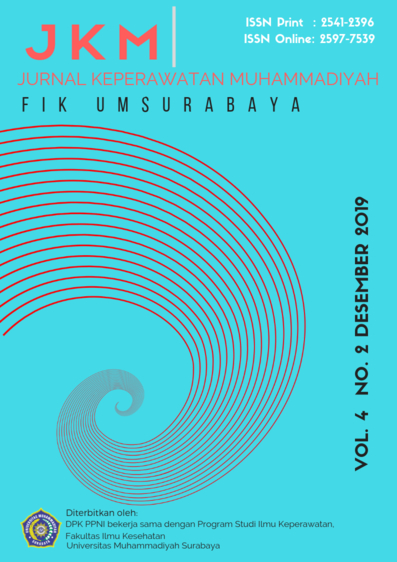Pengaruh Pendidikan Kesehatan Menggunakan Booklet Berbahasa Madura Terhadap Self Management Pada Klien Hipertensi di Poli Jantung Rsud dr. Abdoer Rahem Situbondo
DOI:
https://doi.org/10.30651/jkm.v4i2.2703Keywords:
Hypertension, Health Education, Booklet, Self Management.Abstract
Objective:  Hypertension is one of the main problems of public health, and if still a big challenge in indonesia with a high prevelention amounting to 34,1% (percent). Uncontrolled hypertension will cause complication and death. One of the factors that can cause hypertension is a bad self management. To improve self management on hypertensive dilent is health education needs to be done.
Methods: Â Â The kind of quantitative research with Quasi Experiment design in the form of a Pretest-Posttest Nonequivalent Control Group sampale selection with Simple Random Samping as many as 40 respondets 20 intervention groups, 20 control graups data collection techniaques with self management questioner (H-SCALE).
Results: Â Â Paired T-test results of the intervention group obtained a P-value of 0,000, and in the control group a P-value of 0.106 was obtained. While the results of the Independent T-test in the intervention group and the control group obtained a value of 0,000. So it can be said that there are effects and differences before and after health education is given to hypertension client self management.
Â
Conclusion: Â Â Expected by health education obout hypertension can improve self management on hypertension drent.
References
Artiyaningrum, B., & Azam, M. (2016). Faktor-Faktor Yang Berhubungan Dengan Kejadian Hipertensi Tidak Terkendali Pada Penderita Yang Melakukan Pemeriksaan Rutin. Public Health Perspective Journal.
Andarmoyo, S. (2015). Pemberian Pendidikan Kesehatan Melalui Media Leaflet Efektif Dalam Peningkatan Pengetahuan Perilaku Pencegahan Tuberkulosis Paru Di Kabupaten Ponorogo, (November), 600–605.
Beigi Babaee, M. A., Zibaeenezhad, M. J., Aghasadeghi, K., Jokar, A., Shekarforoush, S., & Khazraei, H. (2014). The Effect of Educational Programs on Hypertension Management. International Cardiovascular Research Journal, 8(5), 94–98.
Dinas Kesehatan Provinsi JawaTimur. (2017). Profil Kesehatan Provinsi Jawa Timur Tahun 2016.
Darmawan, D., & Zulfa, S. (2013). Pengaruh Promosi Kesehatan terhadap Motivasi Pasien Hipertensi Tentang Pelaksanaan Diet Hipertensi Di Poli Klinik Penyakit Dalam RS. Rajawali Bandung.
Dotchterman, J., & Bulechek. (2008). Clinical Aplication of Nursing; Adult, Childs, Womans, Nursing Intervention. Classification Nursing Intervention, Classification The International Journal of Nursing.
Fatimah, N., Ilmi, A. A., & Patima. (2018). Self-Management Dan Dukungan Keluarga Pada Lanjut Usia Dengan Penyakit Kronis, 3(2), 36–45.
Kemenkes RI. (2018). Hasil Utama Riskesdas 2018.
Kurniawati, & Widiatie, W. (2016). Pengaruh Pendidikan Kesehatan Terhadap Kepatuhan Diet Pada Penderita Hipertensi, 7(1), 1–7.
Lindner, H., Menzies, D., Kelly, J., Taylor, S., & Shearer, M. (2003). Coaching for Behaviour Change in Chronic Disease : A Review of the Literature and the Implications for Coaching as a Self-management Intervention, 9(2), 1–9.
Lee, J. K. (2013). Evaluation of a Medication Self - management Education Program for Elders with Hypertension Living in the Community, 43(2), 267–275.
Lestari, I. G., & Isnaini, N. (2018). Pengaruh Self Management Terhadap Tekanan Darah Lansia yang Mengalami Hipertensi, 02(01), 7–18.
Laili, N., & Tanoto, W. (2013). Effectiveness of Self Care-Management to Changes Blood Pressure in Hypertension Patients at Puskemas Bendo Pare Kediri, 658–666.
Motlagh, Z., Fazel, S., Ali, A., & Red, I. (2016). Self-Care Behaviors and Related Factors in Hypertensive Patients, 18(Jun), 1–9.
Mardhiah, A., Abdullah, A., & Hermansyah. (2013). Pendidikan Kesehatan Dalam Peningkatan Pengetahuan , Sikap Dan Keterampilan Keluarga Dengan Hipertensi - Pilot Study. Jurnal Ilmu Keperawatan.
Mariyana, F. (2013). Pandangan Tokoh Masyarakat Terhadap Konsep Adil Wali Nikah (Studi Kasus di Kelurahan Mimbaan, Kecamatan Panji, Kabupaten Situbondo).
Mambang Sari, C. W. (2017). Pemberdayaan Kelompok Peduli Hipertensi Sebagai Upaya Penurunan Hipertensi Di Rajamandala Kulon Bandung Barat, 1(2), 87–89.
Mubarak, I., & Chayatin, N. (2009). Buku Ajar Keperawatan Komunitas 2 Teori dan Aplikasi Dalam Praktek. Jakarta: Sagubg Seto.
Mulyati, L., Yetti, K., & Sukmarini, L. (2013). Analisis Faktor yang Memengaruhi Self Management Behaviour pada Pasien Hipertensi, 1.
Okatiranti, Irawan E., & Amelia, F. (2017). Hubungan Self Efficacy Dengan Perawatan Diri Lansia Hipertensi. Jurnal Keperawatan BSI, V(2), 130–139. Retrieved from http://ejournal.bsi.ac.id/ejurnal/index.php/jk/article/view/2631.
Richard, A. A., & Shea, K. (2011). Delineation of Self-Care and Associated Concepts, 43(Sep), 1–13.
Smeltzer, S. C., & Bare, G. (2008). Brunner & Suddarth’s Textbook of medical Surgical Nursing. Philadelpia: Lippincott.
Saputri, Y. I. (2014). Pengaruh Pendidikan Kesehatan Terhadap Pengetahuan Dan Kepatuhan Diit Hipertensi Pada Lanjut Usia Di Desa Wironanggan Kecamatan Gatak Sukoharjo, 561–565.
Ulya, Z., Iskandar, A., & Asih, F. T. (2017). Pengaruh Pendidikan Kesehatan Dengan Media Poster Terhadap Pengetahuan Manajemen Hipertensi Pada Penderita Hipertensi. Jurnal Keperawatan Soedirman, 12(1), 38. https://doi.org/10.20884/1.jks.2017.12.1.715.
Widyasari, D. F., Candrasari, A., Kedokteran, F., Muhammadiyah, U., Mikrobiologi, B., Kedokteran, F., & Muhammadiyah, U. (2007). Pengaruh Pendidikan tentang Hipertensi terhadap Perubahan Pengetahuan dan Sikap Lansia di Desa Makamhaji Kartasura Sukoharjo, 54–62.
Wowiling, C., Goenawi, L. R., & Citraningtyas. (2013). Pengaruh Penyuluhan Penggunaan Antibiotika Terhadap Tingkat Pengetahuan Masyarakat Di Kota Manado, 2(03), 24–28.
Warsi, A., Wang, P. S., LaVelley, M. P., Avorn, J., & Solomon, D. H. (2004). Self-management Education Programs in Chronic Disease. Archives of Internal Medicine, 164(15), 1641. https://doi.org/10.1001/archinte.164.15.1641.
WHO. (2013). A global brief on Hypertension: Silent killer, global public health crisis.
Wahyuni, S. (2016). Pengaruh Pendidikan Kesehatan Dengan Media Booklet Terhadap Perilaku Self Management Pada Pasien Hipertensi Di Wilayah Puskesmas Balowerti Kediri, 5(1), 133–138.
Yulianti, I. (2013). Booklet Untuk Meningkatkan Pengetahuan Pemberantasan Sarang Nyamuk (PSN) Demam Berdarah Dengue (DBD) Di Desa Plumbungan Kecamatan Karang Malang Kabupaten Sragen. Unnes Journal of Public Health 2 (2) (2013).
Downloads
Published
Issue
Section
License
- Penulis tetap memegang hak atas karyanya dan memberikan hak publikasi pertama kepada jurnal ini yang secara simultan karya tersebut dilisensikan di bawah:Â Creative Commons Attribution-ShareAlike 4.0 International (CC BY-SA 4.0)













